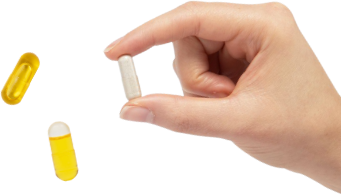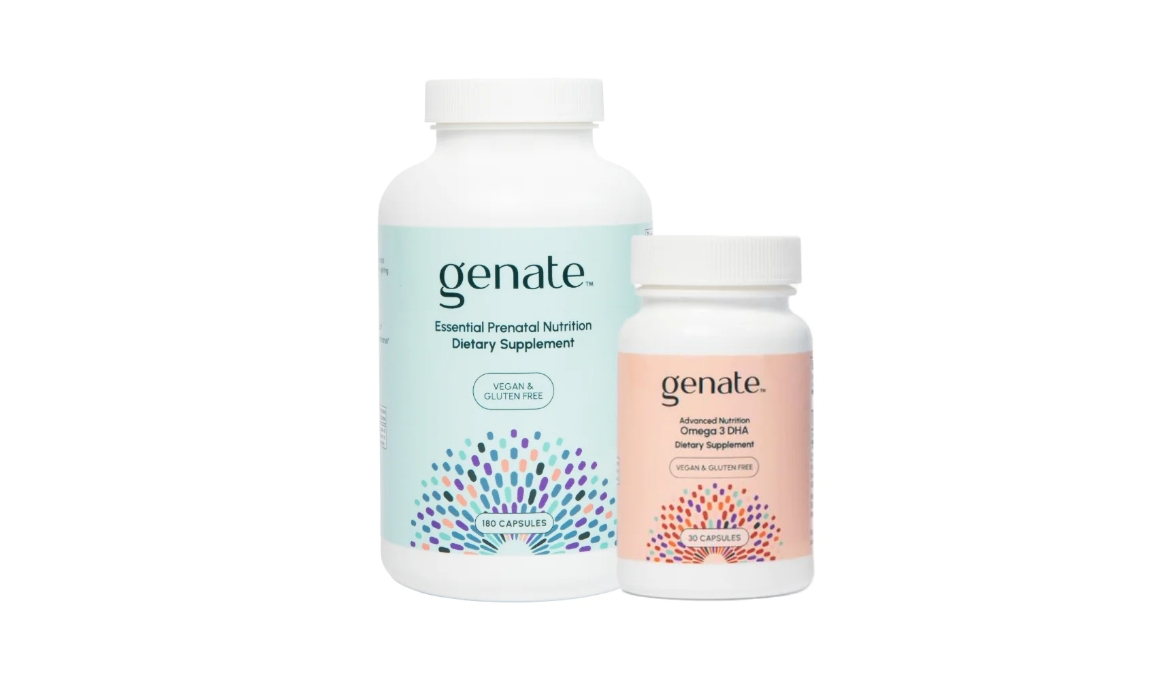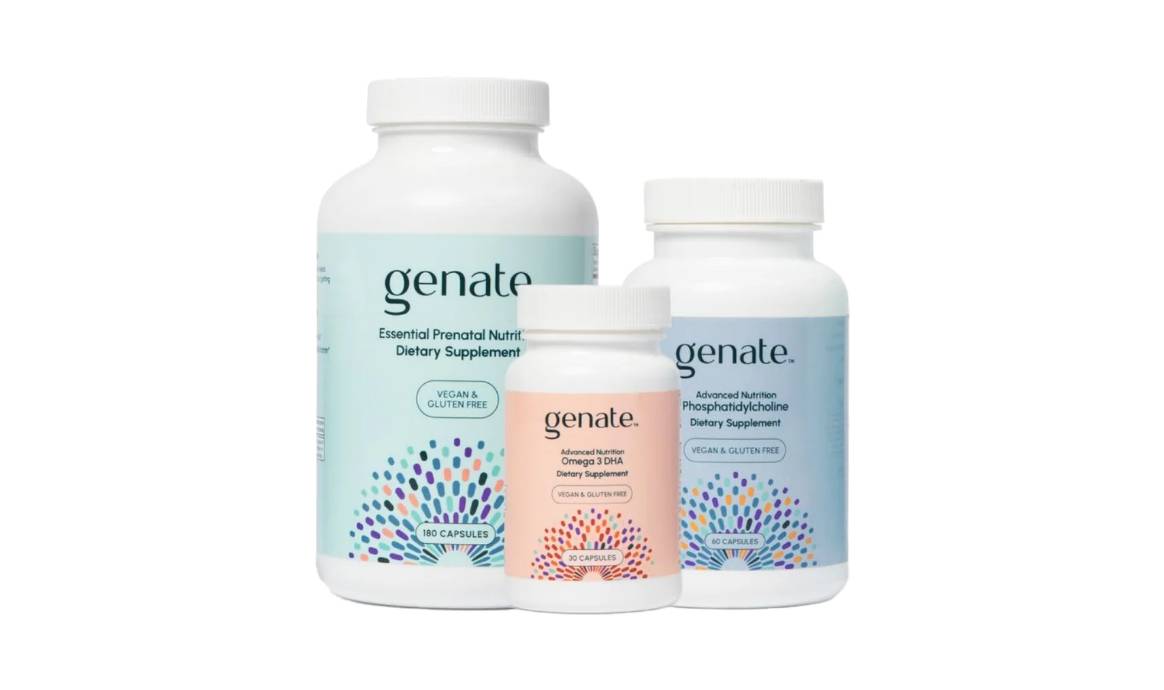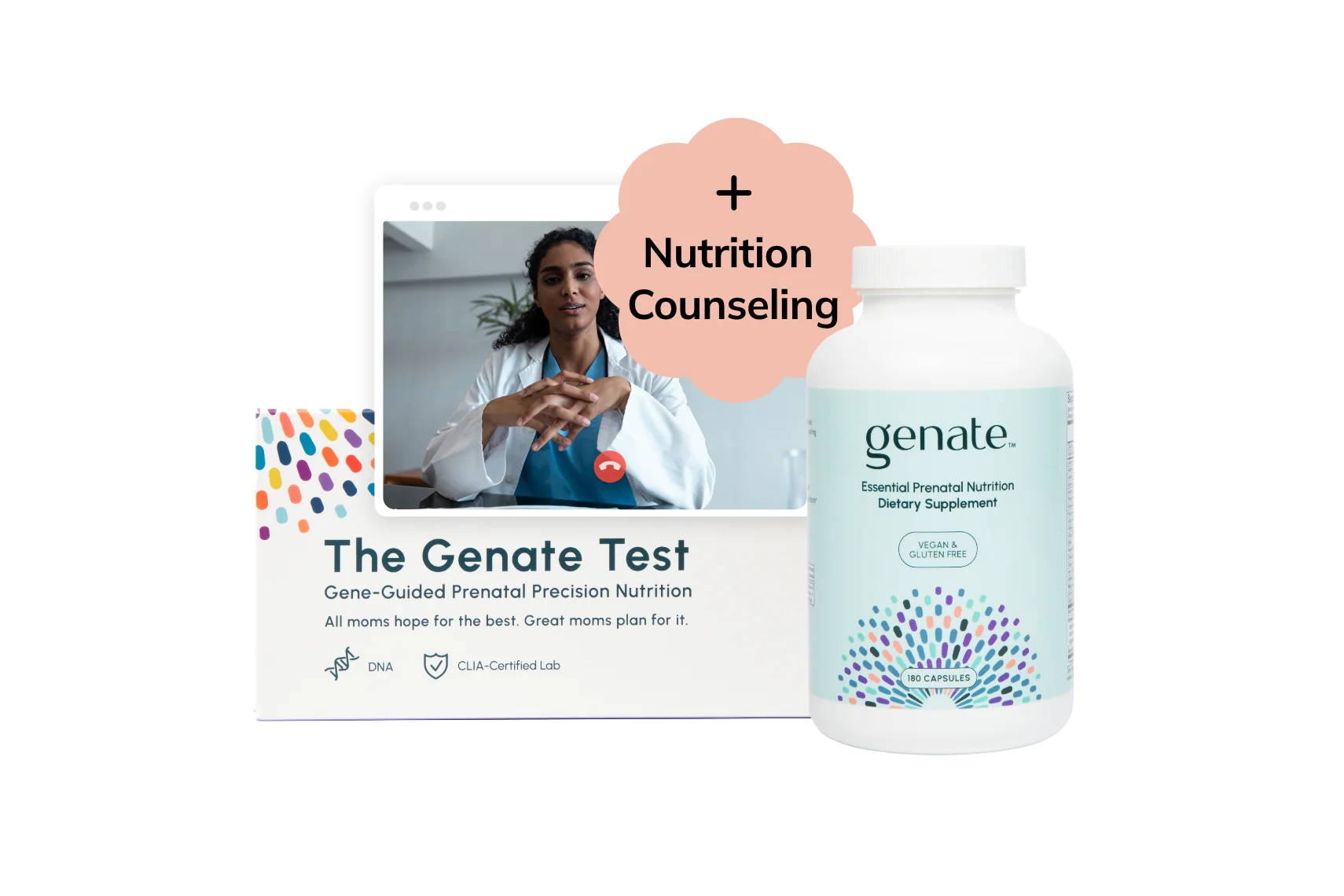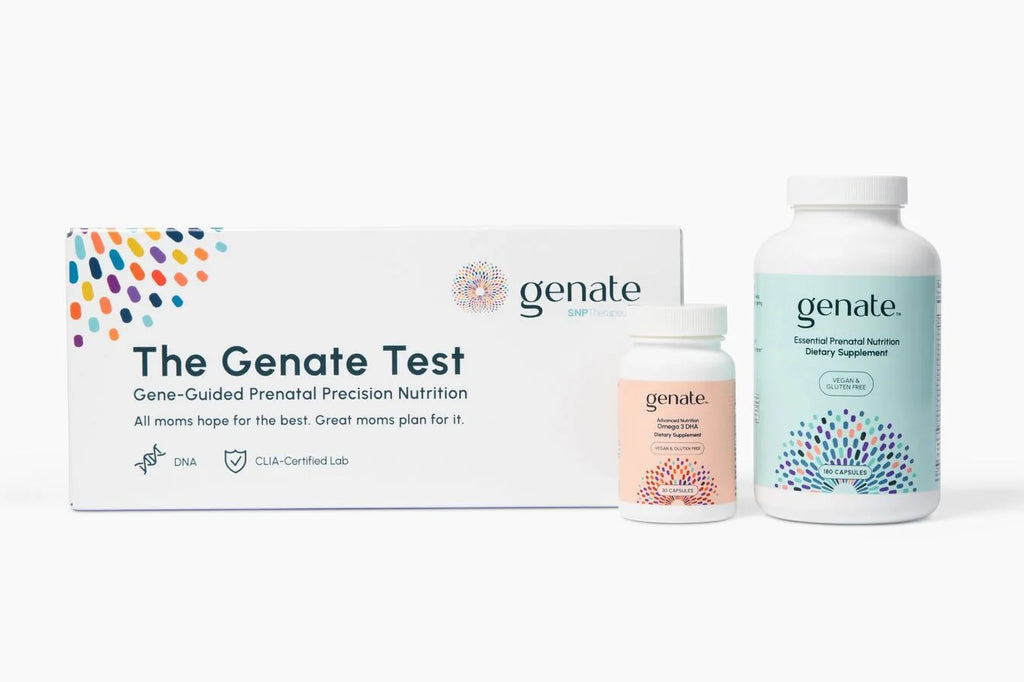Good nutrition is essential for every stage of your baby’s growth and development. But the efficiency with which your body metabolizes nutrients is partly determined by your genes, and common genetic variants can affect the metabolism of one-carbon nutrients that are critical for the development of your child’s brain and spinal cord. Genate Essential Prenatal Nutrition is a multivitamin formulated from academic research that provides women with a formulation optimized to support their baby’s cognitive development. It includes the one-carbon nutrients choline, betaine, methylfolate, and B vitamins that many women have trouble metabolizing and/or don’t get enough of in their diet.

PRENATALS
Health Benefits of DHA and Phosphatidylcholine During Pregnancy
by Jordan Stachel, MS, RDN
medically reviewed by Cara Everett, MS, RDN, LDN
July 3, 2024 • 4-5 minute read
Docosahexaenoic acid (DHA) and phosphatidylcholine are two key pregnancy nutrients that support brain and liver function, and cell membrane structure. Both are vital for your health and your baby’s development. Read our article to learn more about DHA and phosphatidylcholine benefits and how to include them in your prenatal nutrition plan.
DHA and phosphatidylcholine both play critical roles in the body, particularly during the earliest years of life beginning in pregnancy. We'll discuss each nutrient and point you to good sources of DHA and phosphatidylcholine in foods and prenatal vitamins.
What is DHA?
DHA is an omega-3 fatty acid needed for brain health, eye development, and cellular processes.[1] Along with the other omega-3 fats EPA and alpha-linolenic acid (ALA), DHA contributes to the health of every cell in the body by keeping cell membranes flexible. Other roles of DHA include lowering inflammation and blood triglyceride levels.[2]
DHA is particularly important during key life stages like pregnancy and infancy when the brain and eyes are developing and cells are multiplying at a rapid rate.[3] In addition, studies show that adequate intake of DHA by mothers in pregnancy lowers the chance of preterm birth.[4]
Read more about the importance of DHA in pregnancy on our blog.
What is Phosphatidylcholine?
Phosphatidylcholine, or PC, is a nutrient with a long name and an even longer list of critical functions. First, it’s one of the main components of cell membranes. PC also acts as a carrier for fats, taking them from the liver (where dietary fat goes after digestion) to other tissues and organs where they are used for energy or stored for later use.
This is one of the reasons PC is so important for your baby: it transports DHA from your baby’s liver to their brain. You may be eating the recommended amount of DHA during pregnancy (450 mg/day), but if you’re not getting enough PC, your body may not be able to move the DHA out of your liver to your baby’s body.[5]
PC is important as a fat carrier for another reason, too. When fat can’t get out of the liver, it accumulates over time. And that can cause liver inflammation and eventually, fatty liver disease (also called steatotic liver disease).[6]
To sum up, when you’re pregnant, your body sends lots of phosphatidylcholine to your baby for the following functions:
- Development of cell membranes
- Fat metabolism in the liver
- Development of the nervous system
- Brain and nerve cell function
PC is so essential that the body has two ways of making it: from choline and from phosphatidylethanolamine (PE). Several genes regulate these pathways, including one called PEMT. Estrogen increases the activity of PEMT so the mother’s body can make more PC and choline for her baby during pregnancy. We know this is critical for two reasons:
- The amount of choline in cord blood is about three times higher than that of mom’s blood. This is one indication of the additional choline and PC babies need during their early development.[7]
- Children born to moms with lower PC intake score lower on cognitive tests and display more social withdrawal and attention problems, issues that can persist throughout life.[8,9]
Because phosphatidylcholine is so important for developing babies, estrogen turns on one of the major enzymes needed to make it during pregnancy. However studies have found over 70% of women have one or more genetic variants that affect the amount of phosphatidylcholine and choline their body can make. [8]
For these women, it's crucial to get enough from their diet and/or prenatal supplements. A prenatal genetic screening test like Genate can identify genetic variants that affect your body’s phosphatidylcholine production.
Choline’s Relationship to PC
Choline belongs to a group of nutrients called one-carbon nutrients. It’s essential in all stages of life, but it's especially critical during the first 1000 days (pregnancy through the first two years), when the brain is forming at a rapid pace.[10]
In the body, choline can be converted to three other compounds:
- Phosphatidylcholine
- Betaine
- Acetylcholine
We’ve covered phosphatidylcholine; now we’ll take a look at why the other two nutrients are so important for you and your baby during and after pregnancy.
Betaine
Choline takes part in a process called methylation by producing betaine, another one-carbon nutrient. These nutrients get their name from the one-carbon molecules, also called methyl groups, they donate to other compounds in the body. Choline is the primary way we get methyl groups from our diet. The body uses methyl groups for a number of processes, but one of the most important for a developing fetus is DNA methylation, which plays a key role in gene expression (turning genes on or off).
Gene expression affects everything from eye color to disease risk to immune function.[11] Through its conversion to betaine, choline also helps regulate homocysteine levels. That’s super important in pregnancy, because high homocysteine is linked to low birth weight, placental complications, and severe preeclampsia (high blood pressure in pregnancy).[12] Elevated homocysteine is also a risk factor for heart disease, stroke, and blood clots. [13]
Acetylcholine
Choline can also be made into acetylcholine, which is an important neurotransmitter after birth. (Choline serves as your baby’s prime neurotransmitter in the womb.) Without neurotransmitters, your baby’s nerve cells can’t “talk” to each other, and that can cause issues with muscle and nerve function, affecting a wide range of systems throughout the body.
Choline is a precursor to several other vital nutrients for you and your baby during pregnancy. It’s critical to make sure you’re getting enough choline and PC in your diet or from supplements.
Sources of DHA and Phosphatidylcholine
The body can’t make much DHA, so we must get it from foods or supplements.
The top food sources of DHA include:[10]
- Deep cold water fish (salmon, cod, tuna, sardines, mackerel, herring)
- Shellfish
Alpha-linolenic acid (ALA) is an omega-3 fat that can be converted to DHA by the body in small amounts. You can find ALA in the following foods:
- Grass-fed dairy and meats
- Eggs from chickens fed a diet high in omega-3 fats
- Some plant oils (flaxseed, soybean, canola)
- Certain nuts and seeds (almonds, walnuts, chia, flax)

Fish oil and omega-3 supplements also contain DHA in varying amounts. Supplement manufacturers source their DHA from fish oil, krill oil, or algae. Consult your healthcare provider before starting any supplement.

Phosphatidylcholine and choline are also available in a variety of foods. Some of the best food sources include:
- Beef liver and other organ meats
- Red meat
- Eggs
- Caviar
- Fish (salmon, tuna, cod)
- Shiitake mushrooms
- Soybeans
You can also find choline and phosphatidylcholine in supplement form. When shopping for prenatal multivitamins, be sure to choose one like the Genate Essential Prenatal with choline and other one-carbon nutrients to support your baby's brain development.
Phosphatidylcholine and DHA Bottom Line
Pregnancy is an exciting time, and nourishing yourself and your growing baby with the right vitamins and minerals is vital. Phosphatidylcholine and DHA are two of the most important nutrients for your baby's cognitive development.

The Genate Test checks for gene variants that affect how your body processes a variety of nutrients, including phosphatidylcholine and DHA. You can use this information to create a diet and supplement plan that provides the right amount of each nutrient. With the optimal foods and supplements for your genetics, you can help your baby get the best possible start in life.
This article is not intended as medical advice to treat or diagnose any health condition but rather as educational health information for the general public. It should not be used as a substitute for individualized medical care from your healthcare provider.
Shop the Article
Save 23% today!
Genate Essential Prenatal Multivitamin + Advanced Omega-3 DHA Package
Bundle to increase savings and provide the foundational nutrients needed for optimal health and development.
From $72 per month
Save 23% today!
Comprehensive Prenatal Support Package
Genate Essential Prenatal Multivitamin + Advanced Omega-3 DHA + Phosphatidylcholine
Our most comprehensive bundle - you’ll receive our Essential Prenatal Multivitamin, Advanced Phosphatidylcholine, and Advanced Omega-3 DHA.
From $110 per month
Save 30% today!
Comprehensive Prenatal Nutrition Bundle
Buy the Genate Test and a nutrition counseling session with a Genate registered dietitian, and receive a 30-day supply of the Genate Essential Prenatal Multivitamin FREE. Purchase includes a 90-day prenatal multivitamin subscription at our best monthly price.
$309

About Jordan Stachel, MS, RDN
Jordan is an RDN who holds a Master’s degree in Dietetics from The University of Southern California. She has many years of experience helping clients reach their health goals through her clinical work within private practice. It can be difficult for individuals to discern between nutrition information that is both credible and relevant versus misinformation and conflicting guidance. As an expert in the field, Jordan finds great fulfillment in filling this gap by providing detailed clarification and explanation by leading the discussion surrounding nutrition and wellness. Jordan looks forward to continuing to help others achieve the most optimal version of themselves and improve their longevity and to being a dependable source and voice within the field of nutrition and dietetics.
References
- Mount Sinai Health System. Docosahexaenoic acid (DHA). https://www.mountsinai.org/health-library/supplement/docosahexaenoic-acid-dha. Accessed January 9, 2024.
- Weiser MJ, Butt CM, Mojajeri MH. Docosahexaenoic acid and cognition throughout the lifespan. Nutrients. 2016;8(2):99. https://doi.org10.3390/nu8020099
- Cleveland Clinic. Omega-3 Fatty Acids. https://my.clevelandclinic.org/health/articles/17290-omega-3-fatty-acids. Published November 17, 2022. Accessed January 9, 2024.
- National Institutes of Health. Science update: High-dose DHA influences immune responses during pregnancy, may reduce risk of preterm birth. https://www.nichd.nih.gov/newsroom/news/012122-DHA. Published January 21, 2022. Accessed January 9, 2024.
- Cetin I, Carlson SE, Burden C, da Fonseca EB, di Renzo GC, Hadjipanayis A, et al. Clinical practice guideline on behalf of Asia Pacific Health Association (Pediatric-Neonatology Branch), Child Health Foundation (Stiftung Kindergesundheit), European Academy of Paediatrics, European Board & College of Obstetrics and Gynaecology, European Foundation for the Care of Newborn Infants, European Society for Paediatric Research, and International Society for Developmental Origins of Health and Disease. Omega-3 fatty acid supply in pregnancy for risk reduction of preterm and early preterm birth. Am J Obstet Gynecol MFM. 2024;6(2):101251. https//doi.org/10.1016/j.ajogmf.2023.101251
- Cleveland Clinic. Steatotic (Fatty) Liver Disease. https://my.clevelandclinic.org/health/diseases/15831-fatty-liver-disease Updated September 27, 2023. Accessed June 17, 2024.
- van der Veen JN, Kennelly JP, Wan S, Vance JE, Vance DE, Jacobs RL. The critical role of phosphatidylcholine and phosphatidylethanolamine metabolism in health and disease. Biochimica et Biomedica (BBA)- Biomembranes. 2017;1859(9B):1558-1572. https://doi.org/10.1016/j.bbamem.2017.04.006
- Ross RK, Hunter SK, Hoffman MC, McCarthy L, Chambers BM, Law AJ, et al. Perinatal Phosphatidylcholine Supplementation and Early Childhood Behavior Problems: Evidence for CHRNA7 Moderation. Am J Psychiatry. 2016;173(5):509-516. https://doi.org/10.1176/appi.ajp.2015.15091188
- da Costa K, Kozyreva OG, Song J, Galanko JA, Fischer LM, Zeisel SH. Common genetic polymorphisms affect the human requirement for the nutrient choline. FASEB J. 2006;20:1336-1344. https://doi.org/10.1096/fj.06-5734com
- Derbyshire E, Obeid R. Choline, Neurological development and brain function: A systematic review focusing on the first 1000 days. Nutrients. 2020;12(6):1731. https://doi: 10.3390/nu12061731
- NIH National Human Genome Research Institute. Gene Expression. https://www.genome.gov/genetics-glossary/Gene-Expression Updated March 27, 2024. Accessed April 2, 2024.
- Chaudry SH, Taljaard M, MacFarlane AJ, Gaudet LM, Smith GN, Rodger M, et al. The role of maternal homocysteine concentration in placenta-mediated complications: findings from the Ottawa and Kingston birth cohort. BMC Pregnancy Childbirth 2019;(19)75. https://doi.org/10.1186/s12884-019-2219-5
- Ganguly P and Alam SF. Role of homocysteine in the development of cardiovascular disease. Nutr J. 2015;(14)6. https://doi.org/10.1186/1475-2891-14-6
- Korsmo HW, Jiang X, Caudill MA. Choline: Exploring the growing science on its benefits for
Take the Genate Quiz
Take our Nutrition Quiz to learn more about your nutrition journey.
Read Our Latest Articles
Frequently Asked Questions
What are the benefits of my baby getting the proper nutrients?
What are one-carbon nutrients and fatty acids, and why are they important?
One-carbon nutrients and fatty acids are critical for brain and spinal cord development during pregnancy and through the first two years of life. Although all nutrients are important, the one-carbon nutrients choline, folate, betaine, and B vitamins, along with the omega-3 fat DHA, provide the building blocks for proper growth of your developing baby's brain. Research at Cornell and Harvard universities has shown cognitive benefits for children born to mothers who received increased levels of one-carbon nutrients during pregnancy, demonstrating that optimal nutrition during pregnancy can have lasting effects for your baby.
If I buy Genate nutrition supplements, do I still need to take the test?
Genetic testing is a personal choice, and only you can decide what’s best for you and your baby. But the Genate Test is a powerful tool for optimizing your nutrition status, as it identifies genetically-caused metabolic inefficiencies that may influence your body’ ability to make and use the nutrients critical for your baby’s cognitive development. If you have SNPs in any of the nutrient pathways tested, your Genate Report will provide personalized recommendations for optimizing your nutrition. Our registered dietitians can show you how to fill in the gaps with foods and supplementation, if needed, to make sure you’re getting the nutrition you and your baby need.

